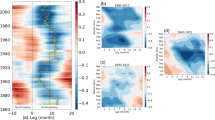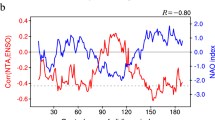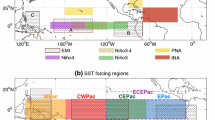Abstract
The influence of the tropical Atlantic on El Niño-Southern Oscillation (ENSO) is examined using dedicated climate model experiments with sea-surface temperature (SST) restoring. Partial SST restoring to climatology in the tropical Atlantic leads to slower decay of ENSO events and to a shift of the power spectrum to longer periods. Perfect model hindcast experiments with and without restoring tropical Atlantic SST to climatology indicate that both the northern tropical and equatorial Atlantic have a very small influence on ENSO development. During decaying ENSO events, on the other hand, northern tropical Atlantic SST anomalies strongly accelerate the decay. Key to the Atlantic influence on ENSO decay are Atlantic SST anomalies just north of the equator (~ 5°N). These lead to local convection anomalies that change the Walker circulation so as to accelerate ENSO decay. Importantly, anomalous events in either the northern tropical or equatorial Atlantic fail to develop in the hindcast ensemble mean, when tropical Pacific SSTs are restored to climatology. This indicates that anomalous tropical Atlantic events in boreal spring and summer are strongly dependent on preceding ENSO events in boreal winter. Thus, the role of the tropical Atlantic is to mediate a negative feedback of ENSO on itself. Despite this passive role of the tropical Atlantic in the Pacific-Atlantic interaction, accurate simulation of the Atlantic feedback should play some role in ENSO prediction. Further model experiments will be required to evaluate model dependence of these findings and to quantify the impact of the Atlantic on ENSO prediction skill.












Similar content being viewed by others
Availability of data and materials
The CMIP6 model output analyzed in this study is made available via the Earth System Grid Federation (ESGF) and can be found at https://esgf-node.llnl.gov/search/cmip6/ or one of the other ESGF nodes. The ERA-5 reanalysis data is available via https://cds.climate.copernicus.eu/cdsapp#!/dataset/reanalysis-era5-single-levels-monthly-means?tab=form. The NCEP/NCAR reanalysis can be obtained via https://downloads.psl.noaa.gov/Datasets/ncep/.
References
Amaya DJ, DeFlorio MJ, Miller AJ et al (2017) WES feedback and the Atlantic meridional mode: observations and CMIP5 comparisons. Clim Dyn 49:1665–1679. https://doi.org/10.1007/s00382-016-3411-1
Bjerknes J (1969) Atmospheric teleconnections from the equatorial Pacific. Mon Weather Rev 97:163–172
Chang P, Fang Y, Saravanan R, Ji L, Seidel H (2006) The cause of the fragile relationship between the Pacific El niño and the Atlantic niño. Nature 443:324–328
Chang P, Ji L, Li H (1997) A decadal climate variation in the tropical Atlantic Ocean from thermodynamic air–sea interactions. Nature 385:516–518. https://doi.org/10.1038/385516a0
Chiang JCH, Sobel AH (2002) Tropical tropospheric temperature variations caused by ENSO and their influence on the remote tropical climate. J Clim 15(18):2616–2631
Delworth TL, Broccoli AJ, Rosati A et al (2006) GFDL’s CM2 global coupled climate models. Part I: formulation and simulation characteristics. J Clim 19(5):643–674. https://doi.org/10.1175/JCLI3629.1
Ding H, Keenlyside NS, Latif M (2012) Impact of the equatorial Atlantic on the El Niño Southern Oscillation. Clim Dyn 38:1965–1972. https://doi.org/10.1007/s00382-011-1097-y
Dippe T, Greatbatch RJ, Ding H (2018) On the relationship between Atlantic Niño variability and ocean dynamics. Clim Dyn 51:597–612. https://doi.org/10.1007/s00382-017-3943-z
Dippe T, Lübbecke JF, Greatbatch RJ (2019) A comparison of the Atlantic and Pacific Bjerknes feedbacks: seasonality, symmetry, and stationarity. J Geophys Res Oceans. https://doi.org/10.1029/2018JC014700
Dommenget D, Semenov V, Latif M (2006) Impacts of the tropical Indian and Atlantic Oceans on ENSO. Geophys Res Lett 33:L11701. https://doi.org/10.1029/2006GL025871
Enfield DB, Mayer DA (1997) Tropical Atlantic sea surface temperature variability and its relation to El Niño-Southern Oscillation. J Geophys Res 102:929–945. https://doi.org/10.1029/96JC03296
Exarchou E, Ortega P, Rodríguez-Fonseca B et al (2021) Impact of equatorial Atlantic variability on ENSO predictive skill. Nat Commun 12:1612. https://doi.org/10.1038/s41467-021-21857-2
Eyring V, Bony S, Meehl GA et al (2016) Overview of the coupled model intercomparison project phase 6 (CMIP6) experimental design and organization. Geosci Model Dev 9:1937–1958. https://doi.org/10.5194/gmd-9-1937-2016
Frauen C, Dommenget D (2012) Influences of the tropical Indian and Atlantic Oceans on the predictability of ENSO. Geophys Res Lett 39:L02706. https://doi.org/10.1029/2011GL050520
GFDL Global Atmospheric Model Development Team (2004) The new GFDL global atmosphere and land model AM2–LM2: evaluation with prescribed SST simulations. J Clim 17:4641–4673. https://doi.org/10.1175/JCLI-3223.1
Griffies SM et al (2005) Formulation of an ocean model for global climate simulations. Ocean Sci 1:45–70
Ham Y-G, Kug J-S, Park J-Y, Jin F-F (2013a) Sea surface temperature in the north tropical Atlantic as a trigger for El Niño/Southern Oscillation events. Nat Geosci 6:112–116. https://doi.org/10.1038/ngeo1686
Ham Y-G, Kug J-S, Park J-Y (2013b) Two distinct roles of Atlantic SSTs in ENSO variability: North tropical Atlantic SST and Atlantic Niño. Geophys Res Lett 40:4012–4017. https://doi.org/10.1002/grl.50729
Hastenrath S, Heller L (1977) Dynamics of climatic hazards in northeast Brazil. Quart J Roy Meteor Soc 103:77–92. https://doi.org/10.1002/qj.49710343505
Hersbach H, Bell B, Berrisford P, Hirahara S, Horanyi A, Munoz-Sabater J et al (2020) The ERA5 global reanalysis. Q J R Meteorol Soc. https://doi.org/10.1002/qj.3803
Illig S, Bachèlery M-L, Lübbecke JF (2020) Why do Benguela Niños lead Atlantic Niños? J Geophys Res. https://doi.org/10.1029/2019JC016003
Jansen MF, Dommenget D, Keenlyside N (2009) Tropical atmosphere—ocean interactions in a conceptual framework. J Clim 22:550–567. https://doi.org/10.1175/2008JCLI2243.1
Jiang L, Li T (2021) Impacts of tropical North Atlantic and equatorial Atlantic SST Anomalies on ENSO. J Clim 34:5635–5655. https://doi.org/10.1175/JCLI-D-20-0835.1
Jiang L, Li T, Ham YG (2022) Critical role of tropical north atlantic SSTA in boreal summer in affecting subsequent ENSO evolution. Geophys Res Lett 49:e2021GL097606. https://doi.org/10.1029/2021GL097606
Kalnay E et al (1996) The NCEP/NCAR reanalysis 40-year project. Bull Am Meteor Soc 77:437–471
Keenlyside NS, Latif M (2007) Understanding equatorial Atlantic interannual variability. J Clim 20(1):131–142. https://doi.org/10.1175/JCLI3992.1
Keenlyside NS, Ding H, Latif M (2013) Potential of equatorial Atlantic variability to enhance El Niño prediction. Geophys Res Lett 40:2278–2283. https://doi.org/10.1002/grl.50362
Kido S, Richter I, Tozuka T, Chang P (2022) Understanding the interplay between ENSO and related tropical SST variability using linear inverse models. Clim Dyn. https://doi.org/10.1007/s00382-022-06484-x
Liao H, Wang C, Song Z (2021) ENSO phase-locking biases from the CMIP5 to CMIP6 models and a possible explanation. Deep Sea Res Part II. https://doi.org/10.1016/j.dsr2.2021.104943
Lübbecke JF, McPhaden MJ (2012) On the inconsistent relationship between Pacific and Atlantic Niños. J Clim 25:4294–4303
Lübbecke JF, Rodríguez-Fonseca B, Richter I, Martín-Rey Marta M, Losada T, Polo I, Keenlyside NS (2018) Equatorial atlantic variability—modes, mechanisms, and global teleconnections. Wiley Interdiscip Rev 9:e527. https://doi.org/10.1002/wcc.527
Martín-Rey M, Rodríguez-Fonseca B, Polo I, Kucharski F (2014) On the Atlantic-Pacific Niños connection: a multidecadal modulated mode. Clim Dyn 43:3163–3178
Martín-Rey M, Rodríguez-Fonseca B, Polo I (2015) Atlantic opportunities for ENSO prediction. Geophys Res Lett 42:6802–6810. https://doi.org/10.1002/2015GL065062
Münnich M, Neelin JD (2005) Seasonal influence of ENSO on the Atlantic ITCZ and equatorial South America. Geophys Res Lett 32:L21709. https://doi.org/10.1029/2005GL023900
Newman M, Sardeshmukh PD, Penland C (2009) How important is air-sea coupling in ENSO and MJO evolution? J Clim 22:2958–2977. https://doi.org/10.1175/2008JCLI2659.1
Penland C, Sardeshmukh PD (1995) The optimal growth of tropical sea surface temperature anomalies. J Clim 8:1999–2024. https://doi.org/10.1175/1520-0442(1995)008%3c1999:TOGOTS%3e2.0.CO;2
Richter I, Behera SK, Masumoto Y, Taguchi B, Sasaki H, Yamagata T (2013) Multiple causes of interannual sea surface temperature variability in the equatorial Atlantic Ocean. Nat Geosci 6:43–47
Richter I, Chang P, Liu X (2020) Impact of systematic GCM errors on prediction skill as estimated by linear inverse modeling. J Clim 33(23):10073–10095
Richter I, Doi T (2019) Estimating the role of SST in atmospheric surface wind variability over the tropical Atlantic and Pacific. J Clim 32:3899–3915. https://doi.org/10.1175/JCLI-D-18-0468.1
Richter I, Doi T, Behera SK, Keenlyside N (2018) On the link between mean state biases and prediction skill in the tropics: an atmospheric perspective. Climate Dyn 50:3355–3374. https://doi.org/10.1007/s00382-017-3809-4
Rodríguez-Fonseca B, Polo I, García-Serrano J, Losada T, Mohino E, Mechoso CR, Kucharski F (2009) Are Atlantic Niños enhancing Pacific ENSO events in recent decades? Geophys Res Lett 36:L20705
Richter I, Tokinaga H (2021) The Atlantic Niño: dynamics, thermodynamics, and teleconnections. In: Behera SK (ed) Tropical and extra-tropical air-sea interactions. Elsevier, pp 171–206
Richter I, Tokinaga H, Kosaka Y, Doi T, Kataoka T (2021) Revisiting the tropical atlantic influence on El Niño-Southern oscillation. J Clim 34(21):8533–8548
Richter I, Xie SP, Behera SK, Doi T, Masumoto Y (2014a) Equatorial Atlantic variability and its relation to mean state biases in CMIP5. Clim Dyn 42(1–2):171–188. https://doi.org/10.1007/s00382-012-1624-5
Richter I, Behera SK, Doi T, Taguchi B, Masumoto Y, Xie SP (2014b) What controls equatorial Atlantic winds in boreal spring? Clim Dyn 43(11):3091–3104. https://doi.org/10.1007/s00382-014-2170-0
Richter I, Xie S-P, Morioka Y, Doi T, Taguchi B, Behera SK (2017) Phase locking of equatorial Atlantic variability through the seasonal migration of the ITCZ. Clim Dyn 48:3615–3629. https://doi.org/10.1007/s00382-016-3289-y
Saravanan R, Chang P (2000) Interaction between tropical Atlantic variability and El Niño-southern oscillation. J Clim 13(13):2177–2194
Tokinaga H, Richter I, Kosaka Y (2019) ENSO influence on the Atlantic Niño, revisited: Multi-year versus single-year ENSO events. J Clim 32:4585–4600. https://doi.org/10.1175/JCLI-D-18-0683.1
Wallace JM, Gutzler DS (1981) Teleconnections in the geopotential height field during the Northern Hemisphere winter. Mon Wea Rev 109:784–812. https://doi.org/10.1175/1520-0493(1981)109%3c0784:TITGHF%3e2.0.CO;2
Wang L, Yu J-Y, Paek H (2017) Enhanced biennial variability in the Pacific due to Atlantic capacitor effect. Nat Commun 8:14887. https://doi.org/10.1038/ncomms14887
Wittenberg AT, Rosati A, Lau NC, Ploshay JJ (2006) GFDL’s CM2 global coupled climate models. Part III: tropical pacific climate and ENSO. J Clim 19:698–722. https://doi.org/10.1175/JCLI3631.1
Xie S-P (1996) Westward propagation of latitudinal asymmetry in a coupled ocean–atmosphere model. J Atmos Sci 53:3236–3250
Zebiak SE (1993) Air–sea interaction in the equatorial Atlantic region. J Clim 6(8):1567–1586. https://doi.org/10.1175/1520-0442(1993)006%3c1567:AIITEA%3e2.0.CO;2
Zhang W, Jiang F, Stuecker MF, Jin F-F, Timmermann A (2021) Spurious North Tropical Atlantic precursors to El Niño. Nat Commun 12:3096. https://doi.org/10.1038/s41467-021-23411-6
Zhang Y, Yu S-Y, Xie S-P, Amaya DJ, Peng Q, Kosaka Y, Lin X, Yang J-C, Larson SM, Miller AJ, Fan L (2022) Role of ocean dynamics in equatorial Pacific decadal variability. Clim Dyn. https://doi.org/10.1007/s00382-022-06312-2
Acknowledgements
We would like to thank the anonymous reviewers for their helpful comments. This work was supported by the Japan Society for the Promotion Science (JSPS) Kakenhi Grants. YK was supported by Grants JP18H01278 and JP19H05703, HT was supported by Grants JP18H01281, JP18H03726 and JP19H05704, and SK was supported by Grant JP21K13997. YK was also supported by Japanese Ministry of Education, Culture, Sports, Science and Technology (MEXT) through the Integrated Research Program for Advancing Climate Models (JPMXD0717935457) and the program for Advanced Studies of Climate Change Projection (JPMXD0722680395).
Funding
This work was supported by Japan Society for the Promotion Science KAKENHI Grants JP18H01278, JP18H01281, JP18H03726, JP19H05703, JP19H05704, and JP21K13997, and by MEXT through the Integrated Research Program for Advancing Climate Models (JPMXD0717935457) and Advanced Studies of Climate Change Projection (JPMXD0722680395).
Author information
Authors and Affiliations
Contributions
All authors discussed the results and contributed to the writing of the manuscript. IR designed the study and wrote the initial draft. IR and YK designed the GCM experiments, and YK carried out the GCM simulations. SK designed and carried out the LIM experiments. All authors read and approved the final manuscript.
Corresponding author
Ethics declarations
Conflict of interest
The authors declare no competing interests.
Additional information
Publisher's Note
Springer Nature remains neutral with regard to jurisdictional claims in published maps and institutional affiliations.
Supplementary Information
Below is the link to the electronic supplementary material.
Rights and permissions
Springer Nature or its licensor (e.g. a society or other partner) holds exclusive rights to this article under a publishing agreement with the author(s) or other rightsholder(s); author self-archiving of the accepted manuscript version of this article is solely governed by the terms of such publishing agreement and applicable law.
About this article
Cite this article
Richter, I., Kosaka, Y., Kido, S. et al. The tropical Atlantic as a negative feedback on ENSO. Clim Dyn 61, 309–327 (2023). https://doi.org/10.1007/s00382-022-06582-w
Received:
Accepted:
Published:
Issue Date:
DOI: https://doi.org/10.1007/s00382-022-06582-w




